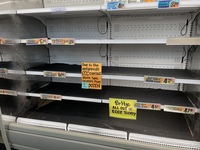 |
| Angelika/Mike Schilli |
|
Angelika In March, I had my birthday. As is well known, birthdays come with cake. However, since eggs are currently in short supply in the USA, we actually had to ration our eggs before my birthday. We skipped our weekend breakfast eggs so that there would be enough left for baking the cake. In the supermarkets here, customers are currently allowed to buy only a certain number of egg cartons. At "Trader Joe's," for example, that's only one carton with 12 eggs per customer per day. However, if customers don't show up first thing in the morning, all they find is empty egg shelves.
It goes without saying that due to the scarcity, the prices for eggs are rising. We already learned this in school about the market economy: The good is scarce, but the demand is high, so the price goes up. In San Francisco, the average price for a dozen eggs is currently a hefty $9. "Trader Joe's" is one of the few supermarket chains that hasn't raised their egg prices exorbitantly yet. There, customers can still get a carton of eggs for $5. However, because of this, the shelves are always particularly quickly emptied. Some restaurants are already adding a surcharge to egg-heavy dishes, such as the chains "Waffle House" and "Denny's."
But why are eggs scarce here in the USA? An outbreak of avian flu is the primary reason. Many chickens had to be culled because they carried the virus. Fewer egg-laying chickens now unfortunately produce fewer eggs for sale. Chicken farms in the USA are often quite large, with up to a million chickens per farm. However, if avian flu breaks out, usually all chickens have to be killed to prevent further spread of the virus.
The prices for eggs had already increased due to inflation before the outbreak of avian flu, and new regulations in some states, such as cage-free housing on chicken farms, have exacerbated the shortage. In California, since 2022, egg-laying chickens on chicken farms can no longer be kept in cages and must be given freedom of movement. These rules also apply to egg producers outside of California if their products are imported here. In fact, California voters had approved Proposition 12, the "Farm Animal Confinement Initiative," in 2018 with 63% of the vote, which mandates humane treatment. It has been implemented since 2022. Especially now during Easter, eggs are in the spotlight. But what to do when eggs are scarce? I recently read in the New York Times that some clever folks are switching to alternatives, such as coloring potatoes instead of eggs. Well, to each their own.













